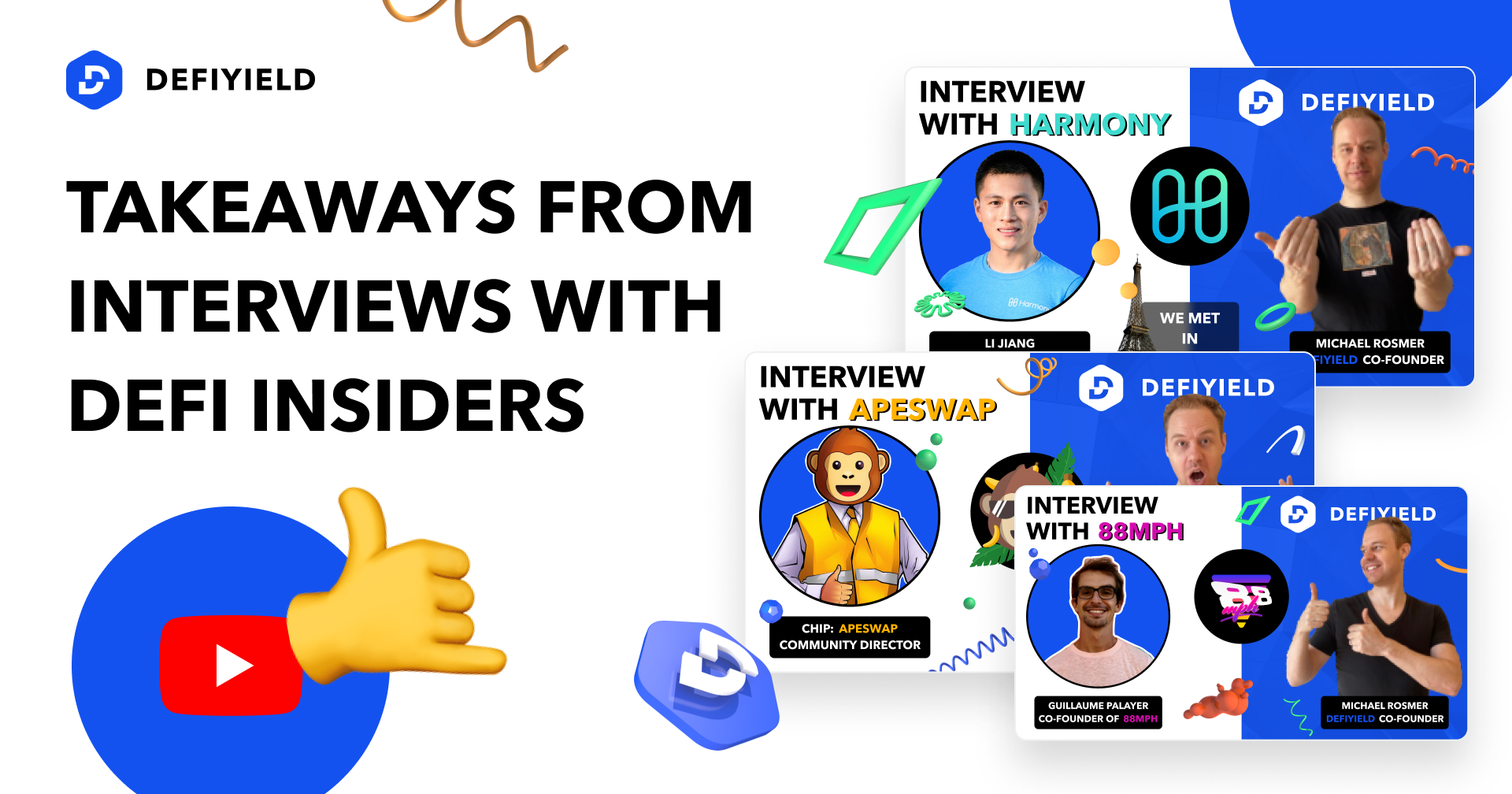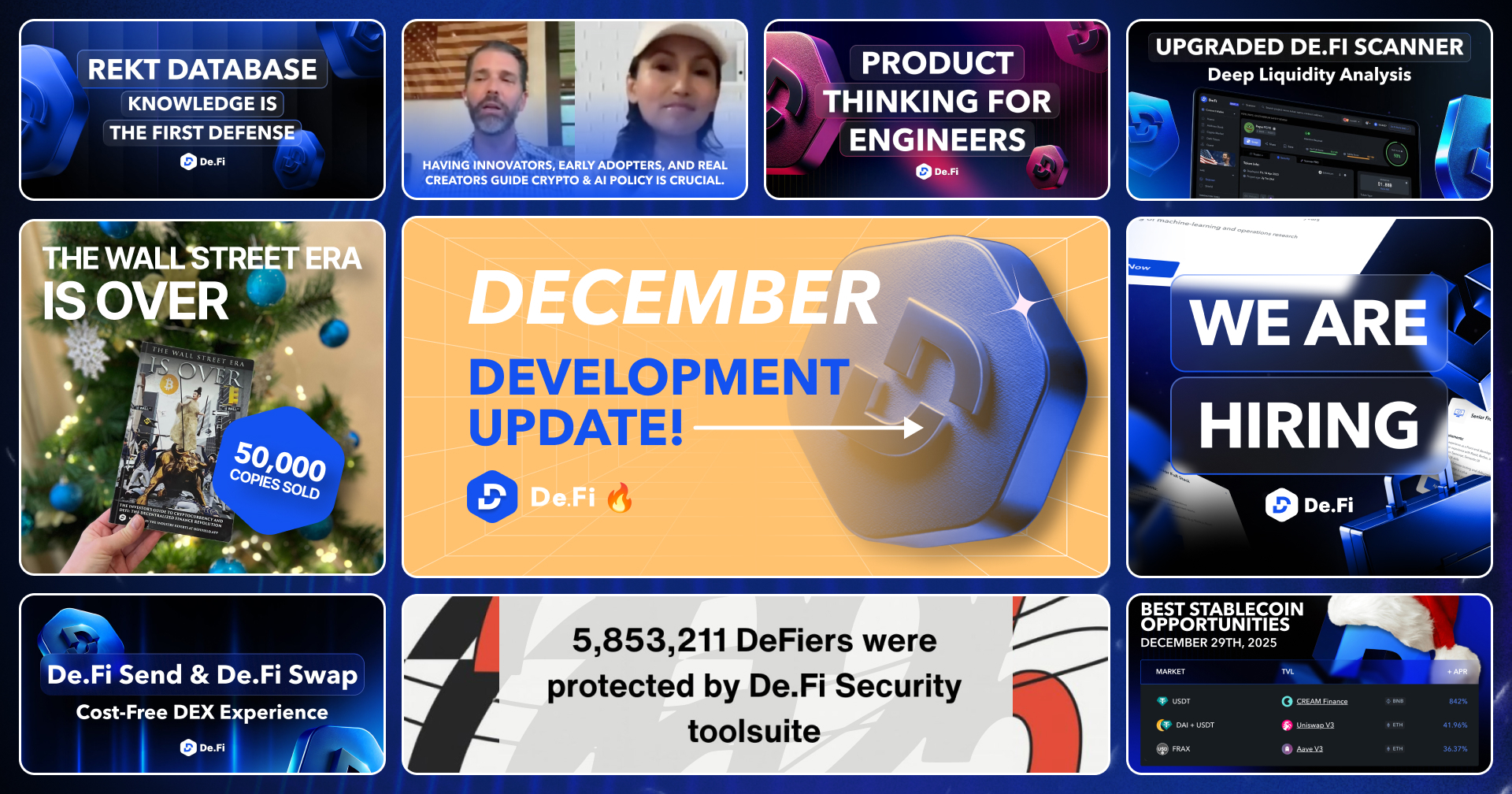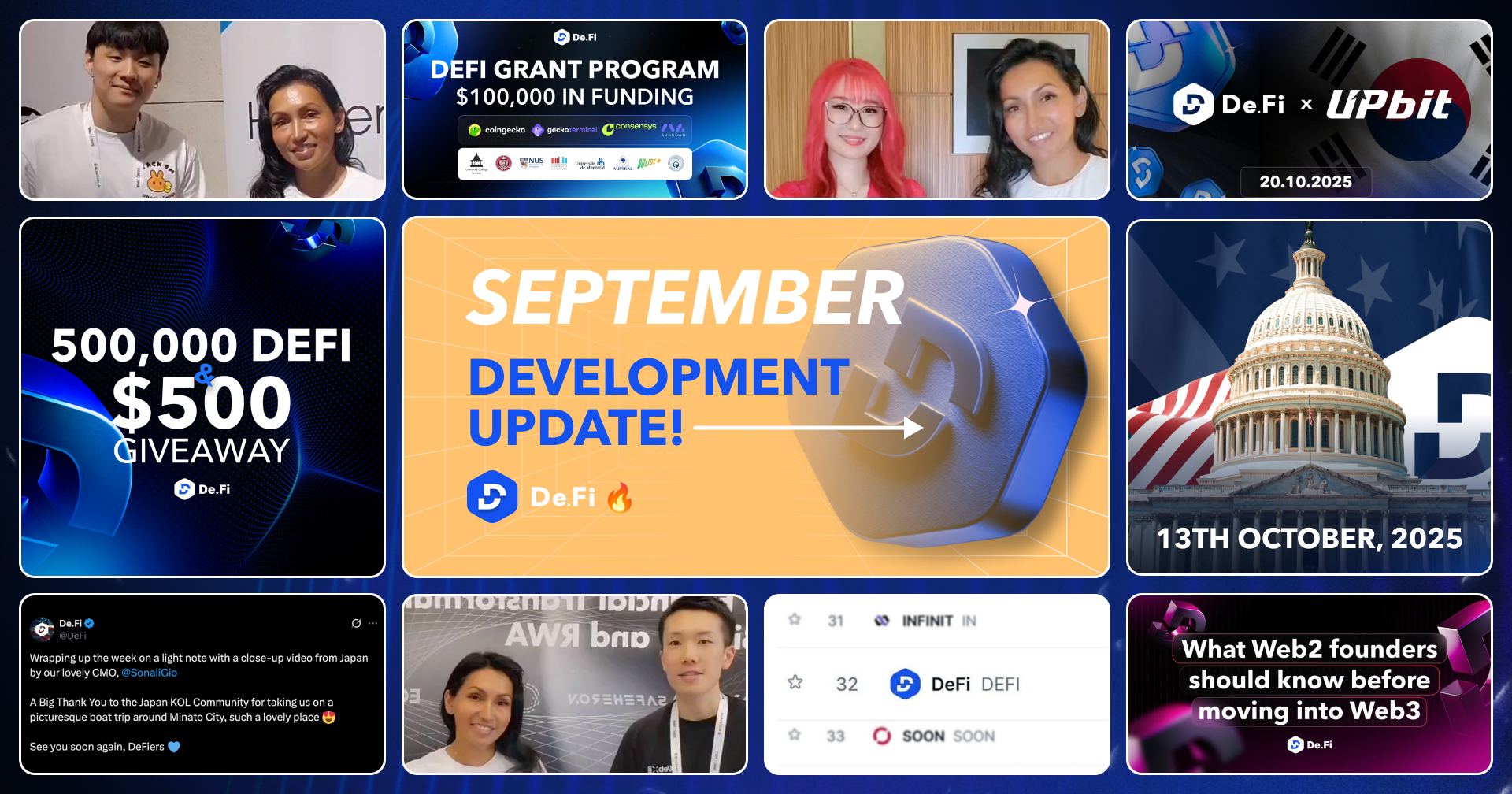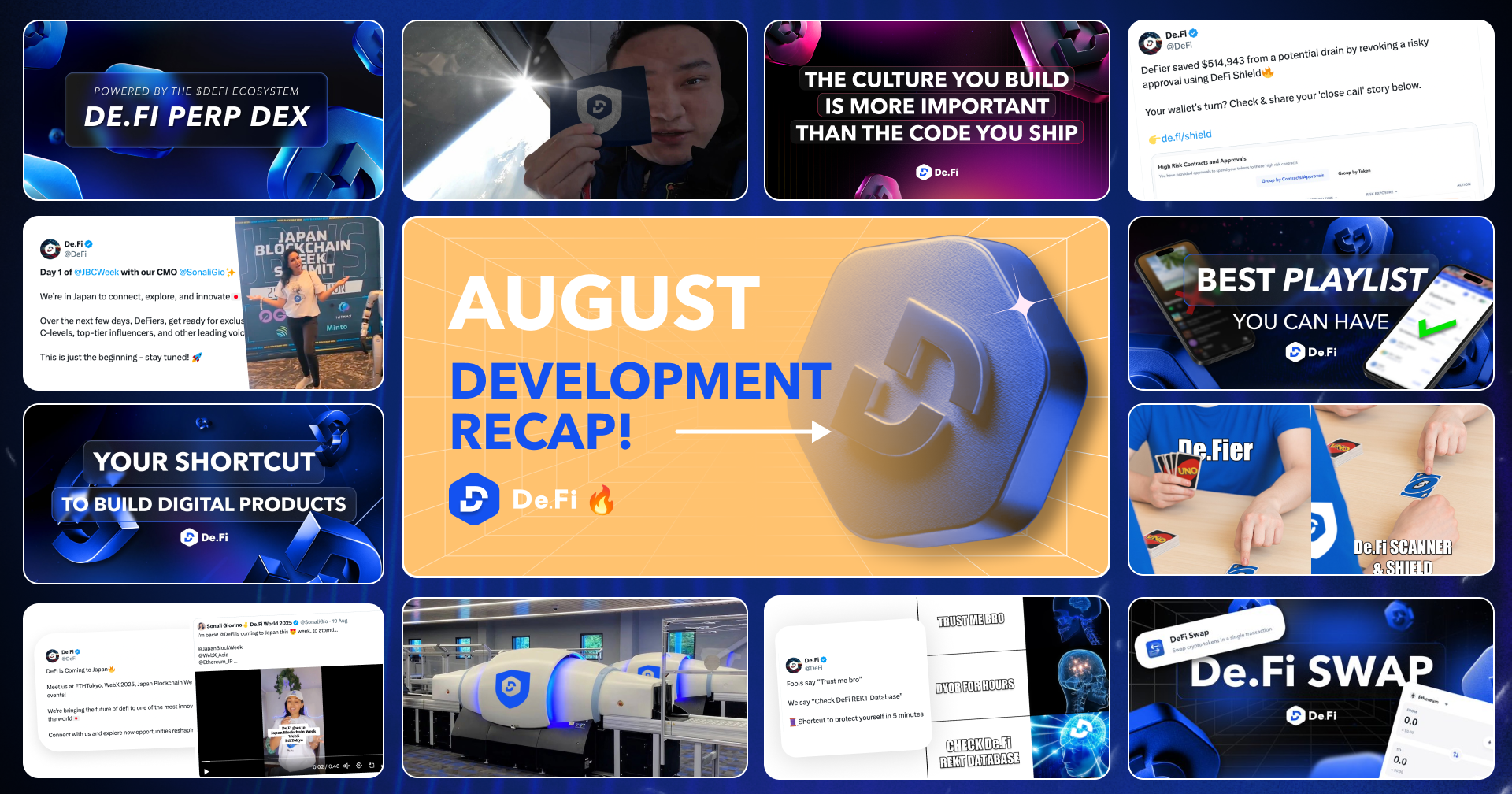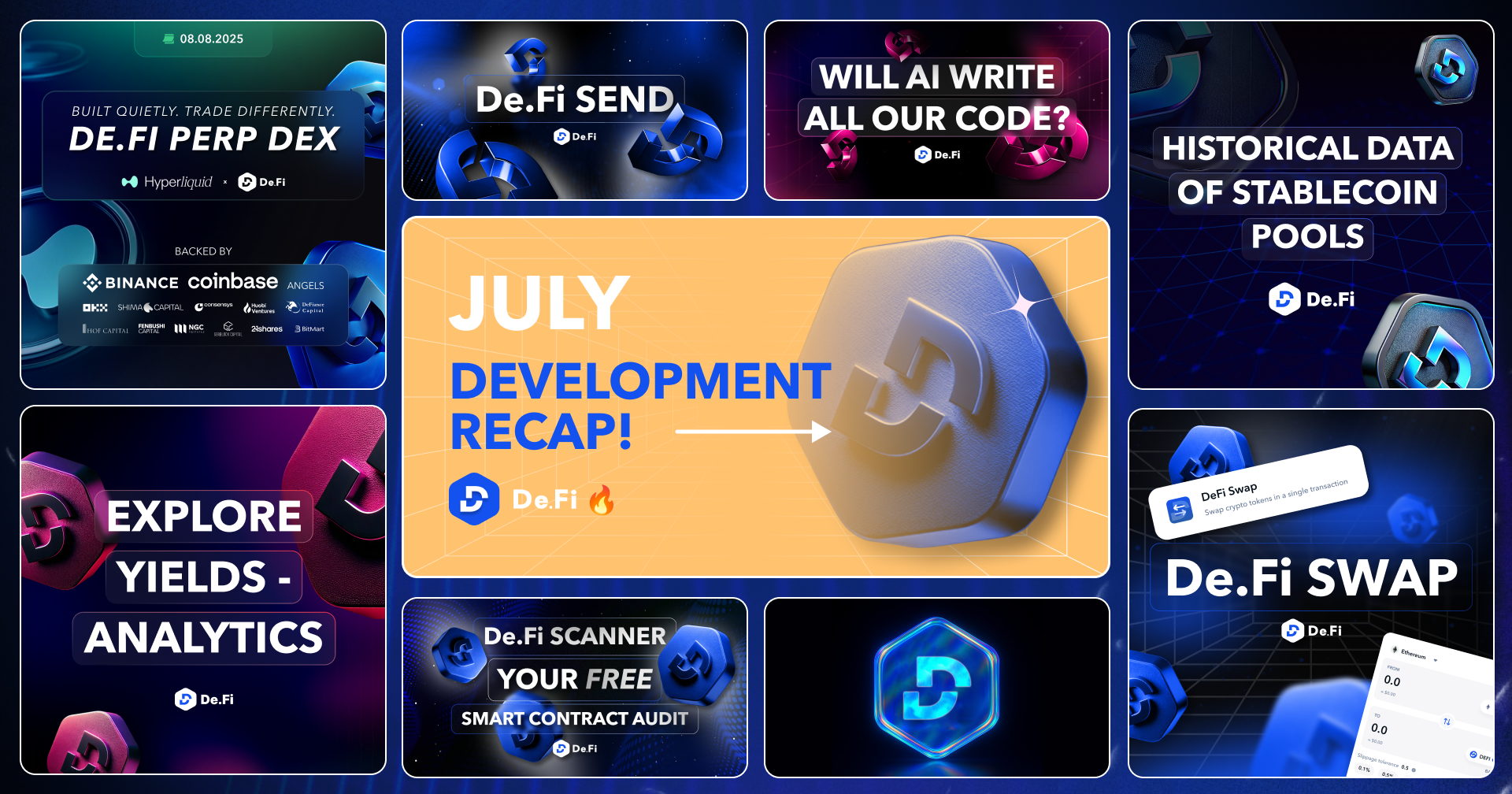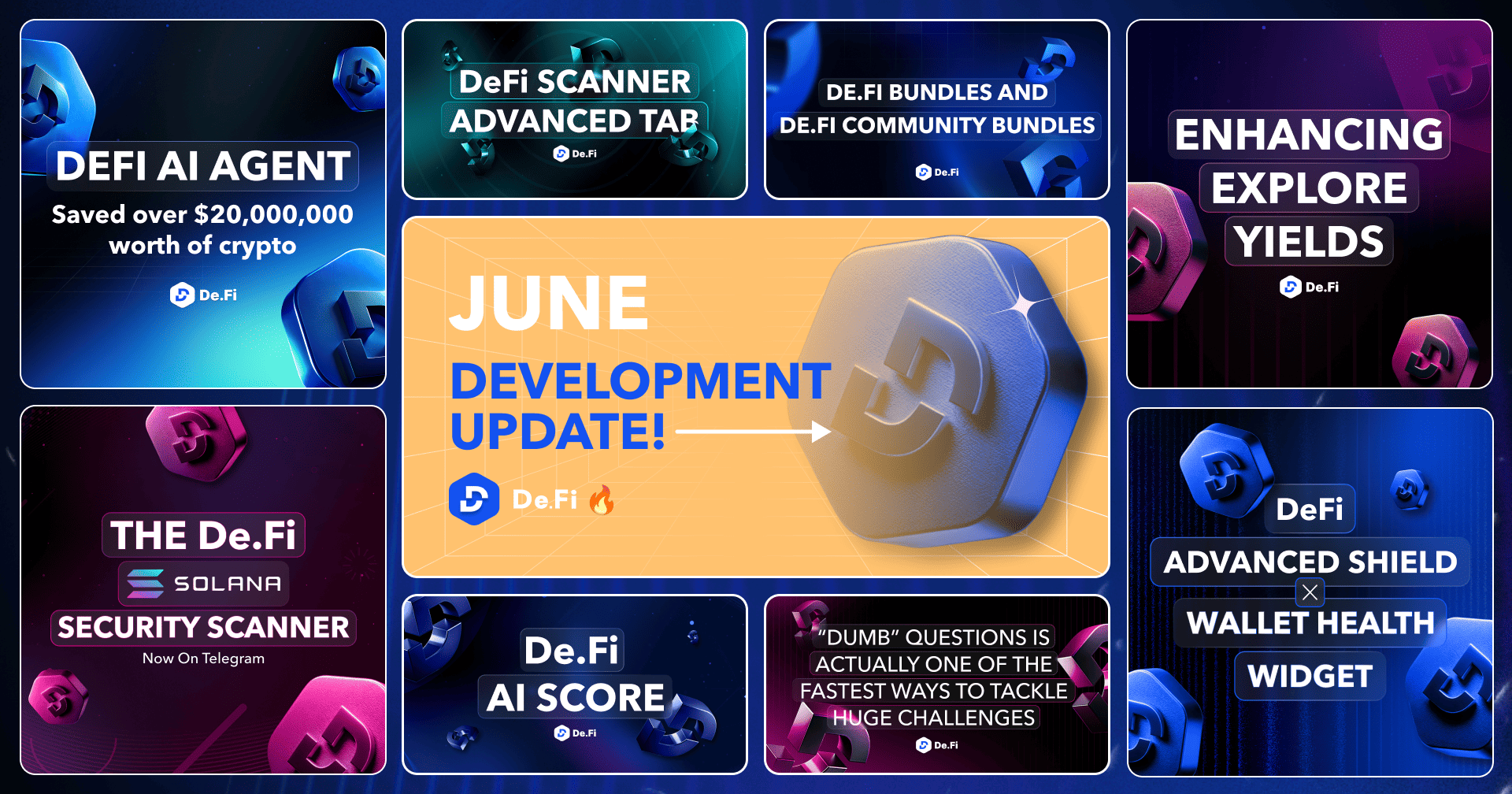Harmony, Apeswap, Bancor and more on our recently launched Youtube channel!
As you may know, recently we’ve launched our own Youtube channel — DeFi. What we found really interesting to try is to speak with other people of DeFi and discuss what’s DeFi about, how projects actually work, and what’s worth knowing.
But we also know that there are many of our supporters that like reading better than listening. As we do really think that these interviews with key players of DeFi are invaluable, we prepared an article with main points that our team members chose. Timecodes included — go and watch a full version of any interview you like!
Table of Content
Interview with 88mph co-founder
What’s the mechanic behind depositing with 88mph?
Best networks to build on
Interview with Apeswap community director
Why is it not possible to create a new Bitcoin?
Are exploits and hacks ethical?
Interview with Harmony COO
What is blockchain for Harmony?
How to handle the barriers of entry to DeFi?
Interview with Launch Zone Biz Dev
KYC in DeFi?
What can make you successful in DeFi?
Thanks!
88mph
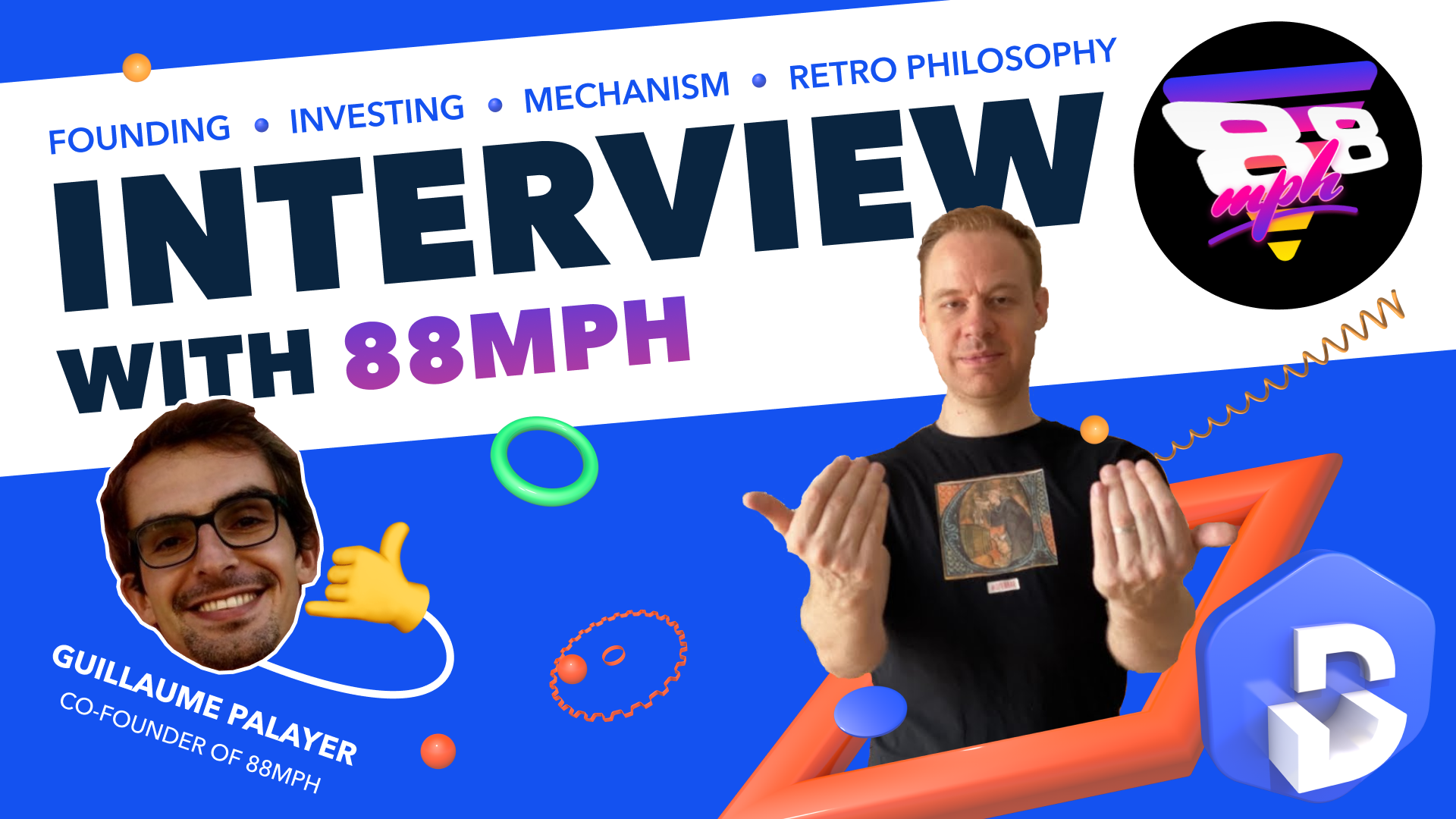
What’s the mechanic behind depositing with 88mph?
Michael: How do you guys manage custody? If someone is depositing with you it is going to Compound or Aave. What’s the mechanic?
Guillaume, co-founder at 88mph: It’s a good question. We’re 100% non-custodial. And the way it works, the money flow is let’s say you have 100 DAI and you deposit it at 88mph — what you’ll be getting in change is an NFT representing your deposit of 100 DAI plus the amount of fixed interest we’re promising to you. So that’s the first part — NFT ERC-721 representing your deposit price of interest. Your money and other users’ money — we’re depositing it on Compound or Aave or whatever market you decided to use on 88mph. When you want your money back — you can withdraw your money early with a penalty — withdrawal fee. We’re incentivizing deposits with our governance token — MPH. With that MPH things basically what you can do is get voting rights.
The best networks to build on
Michael: What about the networks. You guys are built on Ethereum but you also work with Aave and it’s also built on Polygon so are there any plans to go to other platforms and chains?
Guillaume: We’re big fans of ZKsync and we’re mainly waiting to release their things but of course we need an ecosystem so we decided to move when there’s an ecosystem like Aave or others. But from what I heard Aave will be on Arbitrum, Arbitrum will be on Optimism, Optimism will be on ZKsync so it’s not like a zero-sum game when you’re on board on this kind of things so each community has its own user base so you’re adding more and more. If you’re on mainnet but not on Polygon — you’re losing a big chunk of users. So we plan to go on Polygon because it’s the most obvious currently in terms of liquidity and ecosystem partners we can find there like Aave. Mainly Phantom is also an option for us and ZKsync is the most promising.
Apeswap
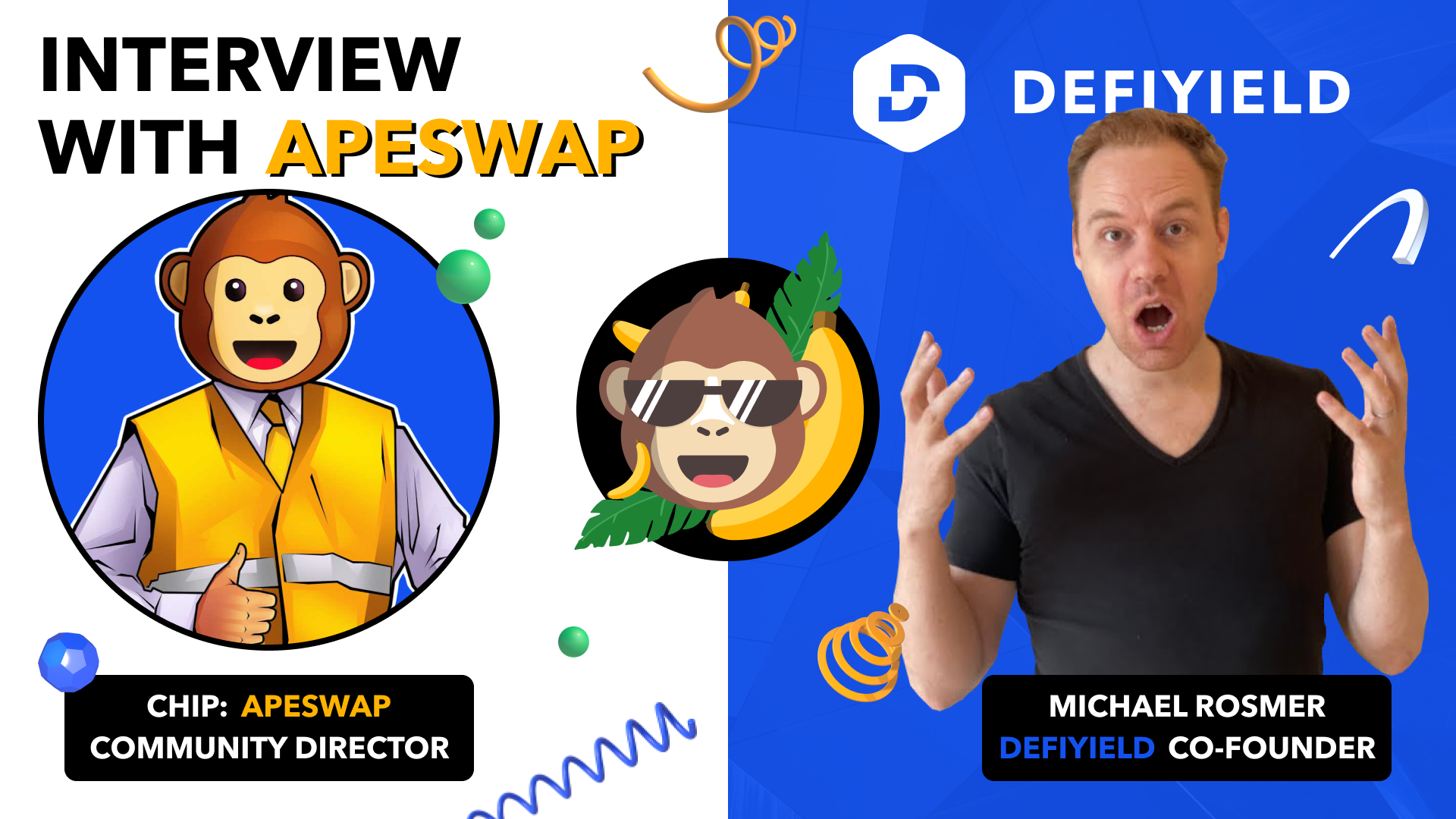
Why is it not possible to create a new Bitcoin?
Michael: I feel like that’s a common thing throughout crypto in general. If you think about for example Some people say “Oh bitcoin isn’t worth anything. Just go and take it and start your own code. It’s like “no, you couldn’t”. Because the value is in this intangible network. It’s actually not the code, it is really valuable about Bitcoin. And the same thing with a lot of these examples like Twitter — it’s really obvious that it’s the network value but it’s interesting how all of these structures have the same commonality to them.
Chip, Apeswap Community Director: You know, my history goes back to kind of the proof of workspace and it’s near impossible to replicate bitcoin security in this modern environment. You kind of see that with the way the projects launch because everything is staking now — everything is proof-of-stake now and validators and delegates produce blocks and there’s no network consensus. Bitcoin has developed the proof-of-work mining space so much that any coin that launches they don’t stand a chance. Someone can throw their hash and take over the network and shut it down, reorganize it, do various things. There isn’t going to be with Bitcoin.
Are exploits and hacks ethical?
Michael: On the one hand, I actually had an ethical conversation with my friend yesterday or the day before and we were talking about this interesting concept that if you find a vulnerability is it ethical to exploit it. You can make different arguments depending on what’s going on. You can see some really insane flash loan attacks that happened and it’s almost always a work of art how sophisticated they are…
Chip: very sophisticated..
Michael: Was that unethical? On the one hand, obviously, you can make arguments why it was unethical but on the other hand, if you know that you’re going to take money and do something good with it — even if you don’t do it, somebody else will do that and they may use money maliciously. So if you have an imperative to go and direct it for good and you get kinda this weird thing around it.
Chip: Yeah I’d like to comment on it. I think you can and I’ve seen this internally with our team, when you’re approaching ethical situations like it’s easy to kinda tie yourself into a pretzel and try to justify different behaviors. But if you take money from people without their consent — it’s never ethical. If you’re leaving people in financial ruin — that’s never gonna be ethical. Bit, that being that, space needs this. The market is really immature, irrational and people rely on the projects that don’t deserve their support and so when these projects that never stood a chance to make it more than a few months — the market runs behind them. And they get exploited — the market needs to leave that project to die. But they keep rallying back to it and keep going back for more and they keep taking part in the ICOs. So I think the process of taking people’s money is never gonna be ethical. These alpha predators are needed to weed out.
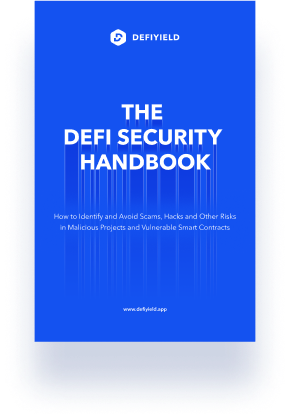
If you wanna stay safe and be up to date — subscribe to our newsletter! We will send you our DeFi Security Handbook straightaway. In the ebook we explain how to stay safe, what are we paying attention to while auditing projects and what should you do to not get REKT. You can expect insights, interesting content and updates from us.
Harmony
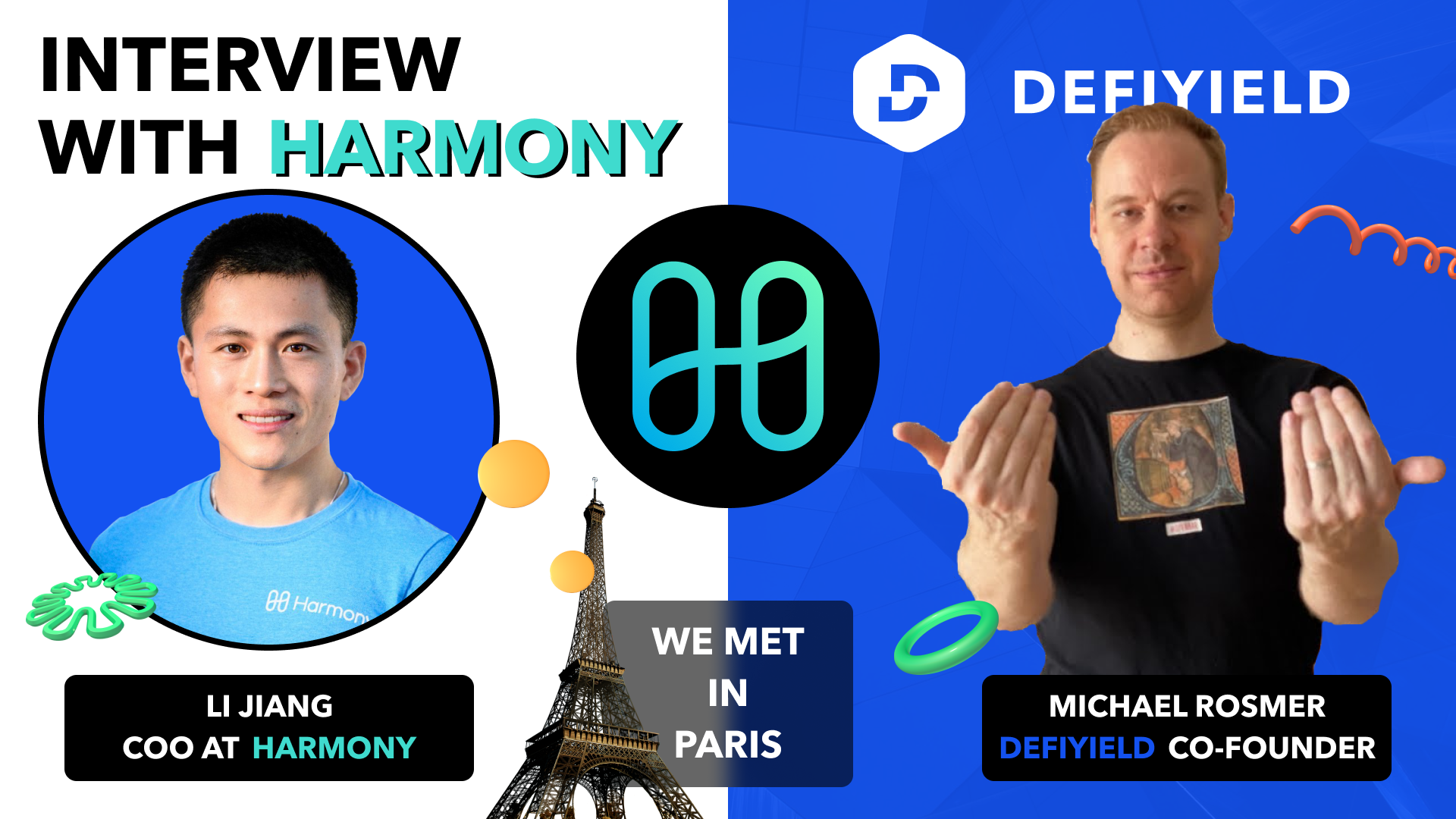
What is blockchain for Harmony?
Li Jiang, COO at Harmony: Blockchain is all about human participation. It’s all about human participation and coordination. I think ECC [Elliptic-curve cryptography] was the best example of the entire community to be inspired and energetic. You can see how the Decentralization process will never go away. Everyone here is gonna die for it because it’s their life.
Same for us. I think that’s what’s so amazing.
Michael: How did you get into this? What was the inspiration to set up Harmony?
Li Jiang: Yeah so it was in 2017 with a group of friends in the bay area in Silicon Valley. I’m not technical but many of the early team and of course the founder were. They’ve built infrastructure skill projects, whether it’s Google Maps, Apple Maps, Google Play Store, Amazon Web Service, Facebook. Everyone was working on massive scale products for Web2.0 companies and it was really an opportunity that the team saw to come out and do something in blockchain that could scale to billions of people and be an open platform.
How to handle the barriers of entry to DeFi?
Li Jiang: We’ve reduced the barrier of entry. 2,000 artists have joined the platform to mint 20,000 NFTs and we’re seeing teenagers, even young children 9–10 years old come and create something. Everyone is using computers these days, they are all online.. That’s really what we are thinking about is how to democratize access to blockchain. Because if you think about blockchain — you think “What’s the purpose?”. And one of the purposes is to give an opportunity to everyone in the world. I’d say if you’re a teenager growing up in a rural place, poor in a third world country, you didn’t have opportunities in Web2.0 — all the opportunities for the well-educated people in San-Francisco. But with Web3.0 you can create art, you can write a blog, create a DeFi protocol to start, launch anything — if you have skills and talent and learn by yourself. And that’s what Harmony is about — to democratize these opportunities. You don’t need $100 to start.
Launch Zone
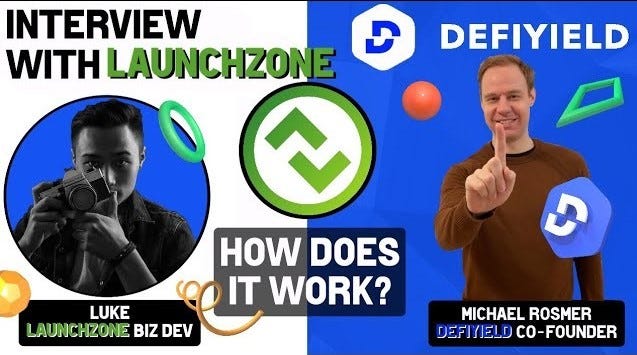
KYC in DeFi?
Michael: You mentioned that you require KYC. Does that mean that they can’t be private from the public? If a private team — they’re a bunch of these — could they reveal them to you but that information won’t be available to the public?
Luke: Yes. So, that KYC process is mainly about our branding protection. As long as they are not gonna rug pool soon — KYC is like a safe life, so we’re saving ourselves. The process gonna be support one way or another when they work with Launch Zone but the incubation process only happens with the projects when we see that’s really potential and we’re gonna need to have more support and care for them.
What can make you successful in DeFi?
Michael: Have you noticed what makes a project successful or not successful? What have you seen? Are there any common things?
Luke: Well, I guess we can have a lot of answers for this. So from my perspective is the loyalty of the project to its idea and also to the value that he’s trying to get to the community. So for all the things that we have done so far and also about the things we have been through and other changes that we’ve made from the brand naming or token itself — everything about us works for you until now. But what’s really staying with us is still the same. It’s the idea of connecting really good projects to the community.
Thanks!
We’re glad you made it through to this sentence. Hope you found something meaningful — we really want to hear from you. Join the conversation in Telegram or reply to us on Twitter.
Join De.Fi — join the revolution.
Check our guides:
Solana Network Ultimate Yield Farming Guide [Infographics]
Fantom Network Ultimate Yield Farming Guide [Infographics]
Huobi ECO Chain Ultimate Guide for Yield Farming
Polygon Network Ultimate Guide for Yield Farming
Binance Chain Ultimate Guide for Yield Farming
EOS Ultimate Yield Farming Guide
Good luck in farming!
